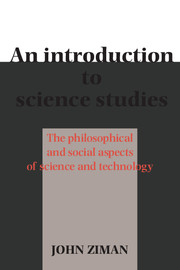Book contents
- Frontmatter
- Contents
- Preface
- 1 ‘Academic’ science
- 2 Research
- 3 Validity
- 4 Communication
- 5 Authority
- 6 Rules and norms
- 7 Change
- 8 The sociology of scientific knowledge
- 9 Science and technology
- 10 Pure and applied science
- 11 Collectivized science
- 12 R & D organizations
- 13 The economics of research
- 14 Science and the State
- 15 The scientist in society
- 16 Science as a cultural resource
- Index
15 - The scientist in society
Published online by Cambridge University Press: 05 August 2012
- Frontmatter
- Contents
- Preface
- 1 ‘Academic’ science
- 2 Research
- 3 Validity
- 4 Communication
- 5 Authority
- 6 Rules and norms
- 7 Change
- 8 The sociology of scientific knowledge
- 9 Science and technology
- 10 Pure and applied science
- 11 Collectivized science
- 12 R & D organizations
- 13 The economics of research
- 14 Science and the State
- 15 The scientist in society
- 16 Science as a cultural resource
- Index
Summary
‘When you see something that is technically sweet, you go ahead and do it and you argue about what to do about it after you have had your technical success. That is the way it was with the atomic bomb.’
J. Robert OppenheimerTowards a social psychology of science
Science is what scientists do. The scientific life is notorious for the demands it makes on the mind and on the spirit. The social psychology of science is thus an essential metascientific discipline, along with philosophy, sociology, politics and history.
The traditional academic ethos (§6.3) lays great stress on the individuality of scientists, and thus emphasizes the distinctive mental and emotional traits that tend to separate them from the mass of people and from one another. The naïve history of science is a chronicle of heroic or saintly personalities who have triumphed through their innate abilities and virtues. More seriously and soberly, psychologists have tried to delineate or discover the personality types that are characteristic of scientists in general, or of scientists in particular disciplines, such as theoretical physics or experimental biology.
Unfortunately, these investigations have not proved very conclusive. Mature scientists, and even science students, are not, presumably, ‘just like everybody else’, but careful empirical research on their personality traits has not provided reliable insights that are superior to everyday ‘folk’ understanding of these matters.
- Type
- Chapter
- Information
- An Introduction to Science StudiesThe Philosophical and Social Aspects of Science and Technology, pp. 173 - 182Publisher: Cambridge University PressPrint publication year: 1984



